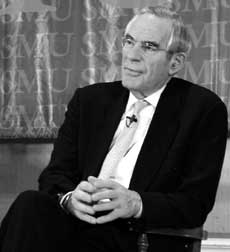
Tate speaker criticizes media’s self-obsessive role
David Halberstam’s Tate lecture was a state-of-the-media address.
The Pulitzer Prize- winning author was openly severe in his assessment of the “self-obsessed” media.
“Journalists today have to work harder to make people think,” Halberstam said.
The Willis M. Tate Distinguished Lecture Series brought Halberstam to McFarlin Auditorium to discuss the “Culture of Celebrity.”
Instead television is giving people what they want with no regard to what they need. The networks have redefined news to topics that don’t require thought, Halberstam said.
The United States has monopolized world power, and its role in the world is greater than ever but prior to September 11 most network foreign correspondents were sent looking for other jobs. Technological advances and a growing economy made it possible for Americans to very nearly collapse in exhaustion after the passing of Watergate and the Cold War, Halberstam said.
As the people became more self absorbed, sitting nightly in a national sŽ#233;ance before their televisions, the networks followed, he said.
The proprietary media moguls of yore had their shortcomings yet were motivated by a larger responsibility to their customers, the people, to retain respectability, he said. The current managerial generation has no sense of public responsibility. Their customers now are the people that buy network stock.
Halberstam questioned the authentic and the inauthentic and said networks have lost the respective importance of reality and celebrity today. Stardom and notoriety have become the mainstay of the increasingly tabloid newsmagazines. Entertainers are the new, but transitory, royalty, He said.
“The brief Warholian moment is now more realistically about five minutes,” Halberstam said.
The inauthentic are winning by coming into the home over television newsmagazines, he said. The voices of popular culture are the voices of the inauthentic. Celebrities and authors need not be complicated. Provocative works for TV, “the more tabloid and provocative the better. In our self-imposed social isolation we have become a celebrity obsessed society feeding on itself,” Halberstam said.
“The self-obsessed media is chasing self-obsessed celebrities of little or no real importance,” he said. Tabloid magazines proliferated under the guise of news, and “the greatest sin is not to be wrong but to be boring.”
Halberstam’s criticism focused on the shortcomings of the media in its cursory and limited coverage of public affairs and processes. The energy of the media is limited, and if that energy is used somewhere it is lost for another. He used the analogy of the possible replacement of Ted Koppel’s Nightline on ABC by David Letterman’s late-night program. Letterman has declined to replace one of the few serious news programs but the network still contends that Nightline is no longer relevant, Halberstam said.
“If Koppel and Nightline are no longer relevant, then what is relevant?” Halberstam asked.
What concept is there of what is owed back to the community? He quoted Edward R. Murrow on the position of TV as “the biggest classroom in the world.”
The power of TV has grown with every advance in technology such as cable, satellite and digital communication, until it has a value of its own, Halberstam said. Murrow’s educative medium now seeks corporate profits chasing the society’s desire to be entertained by itself Halberstam said.
Halberstam will be back on the SMU campus Wednesday to meet with ethics and journalism students and for the second annual Academic Summit.








